
Posted on 01/28/2020 5:11:28 AM PST by Homer_J_Simpson



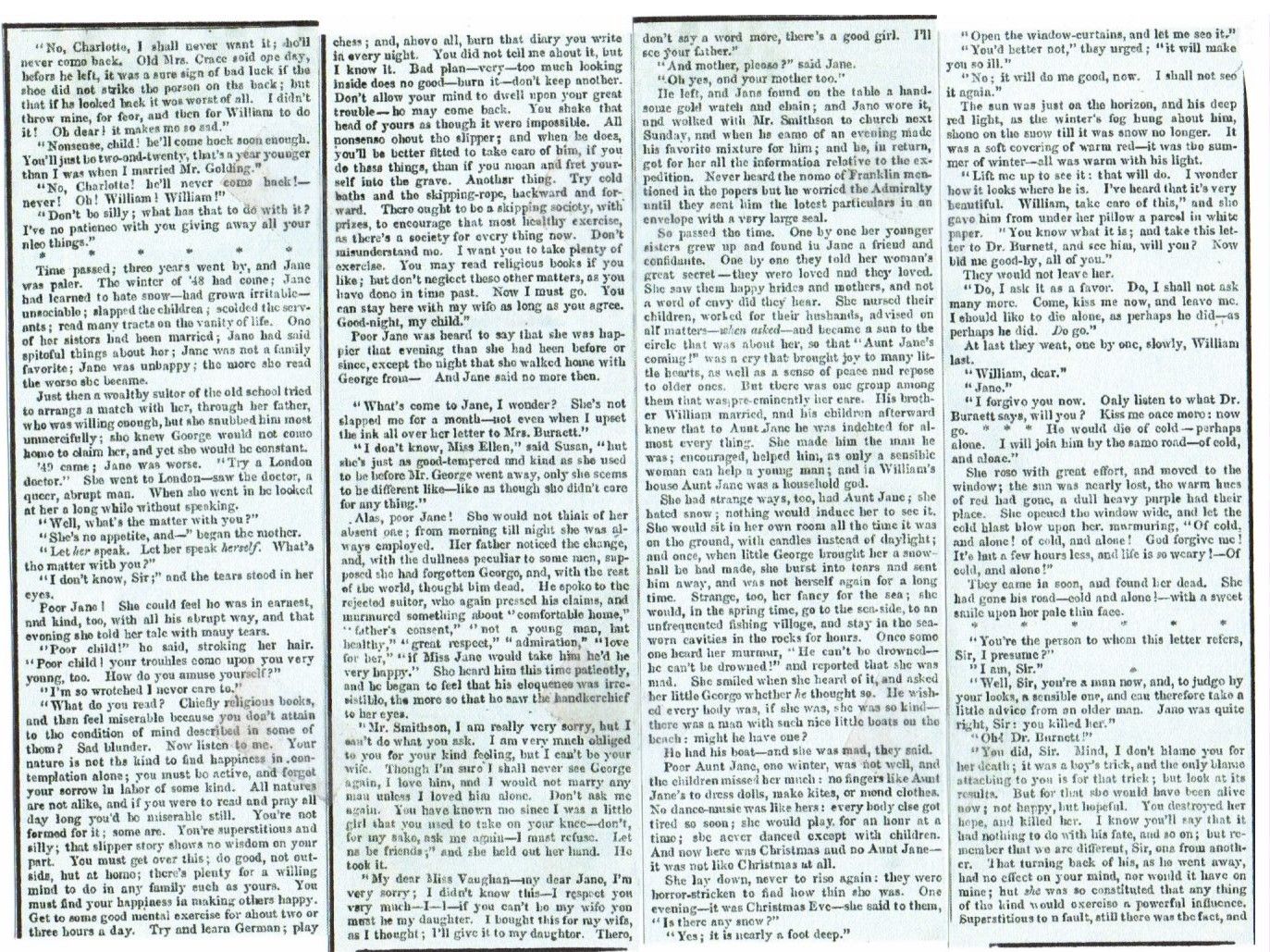
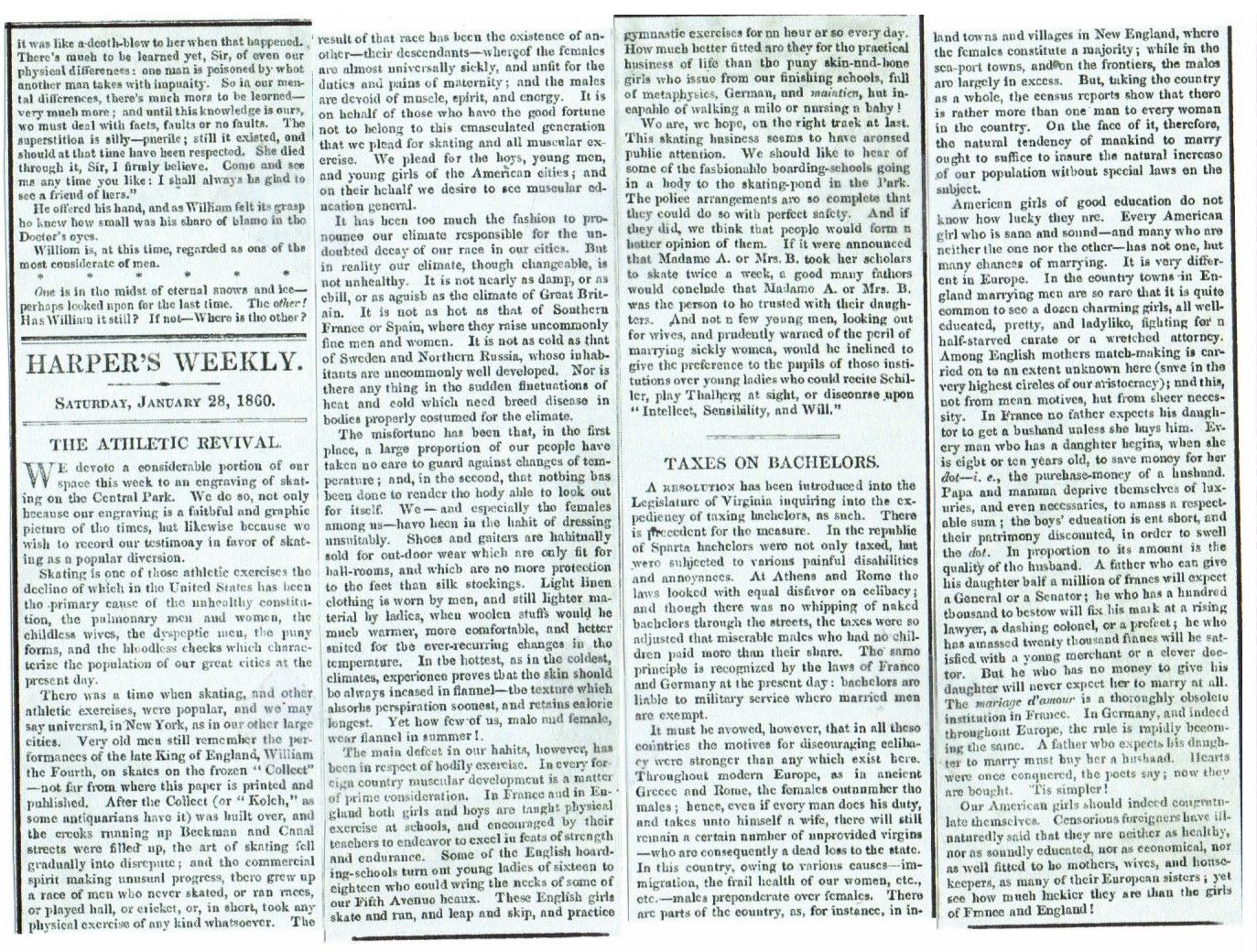

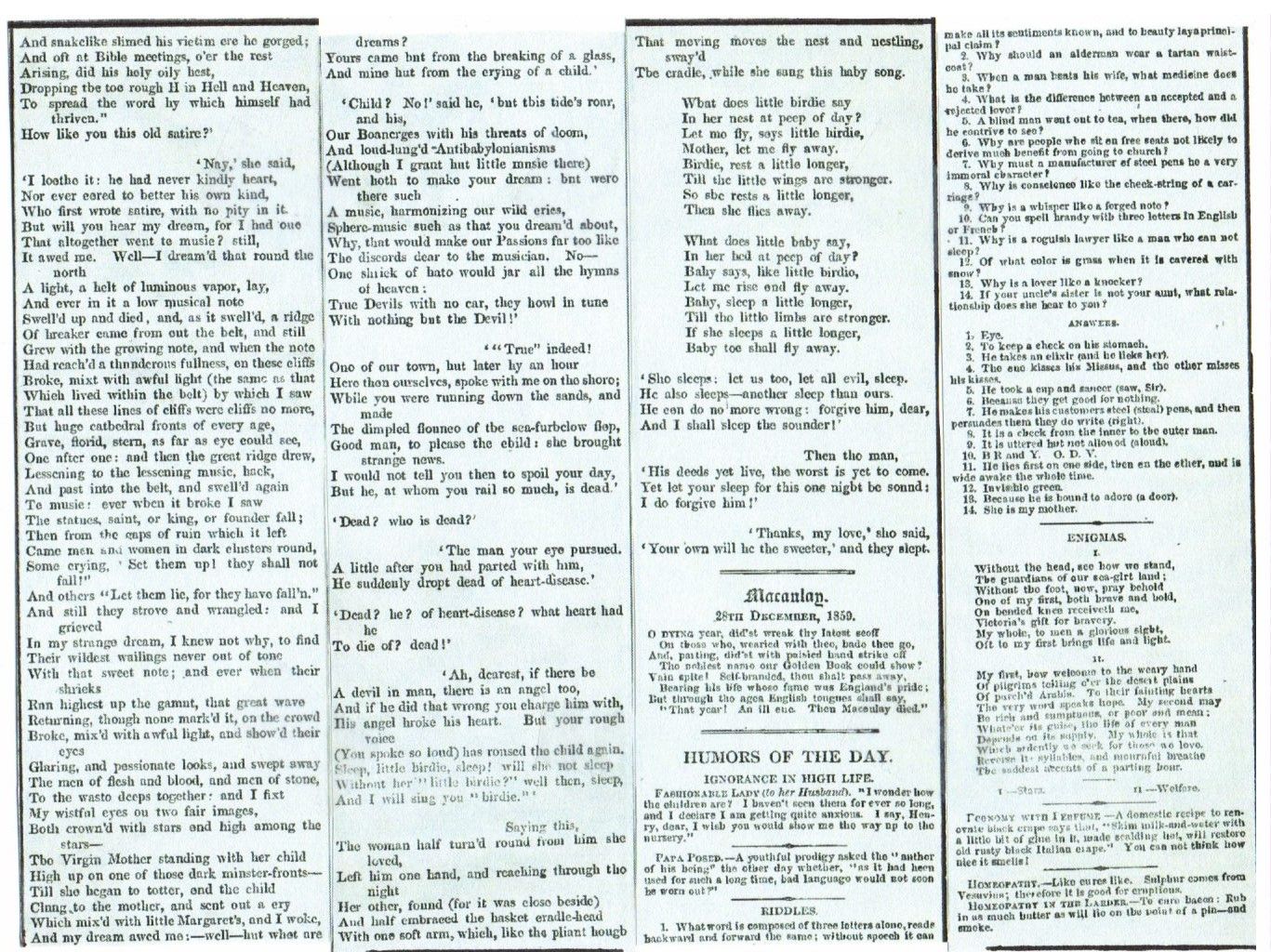






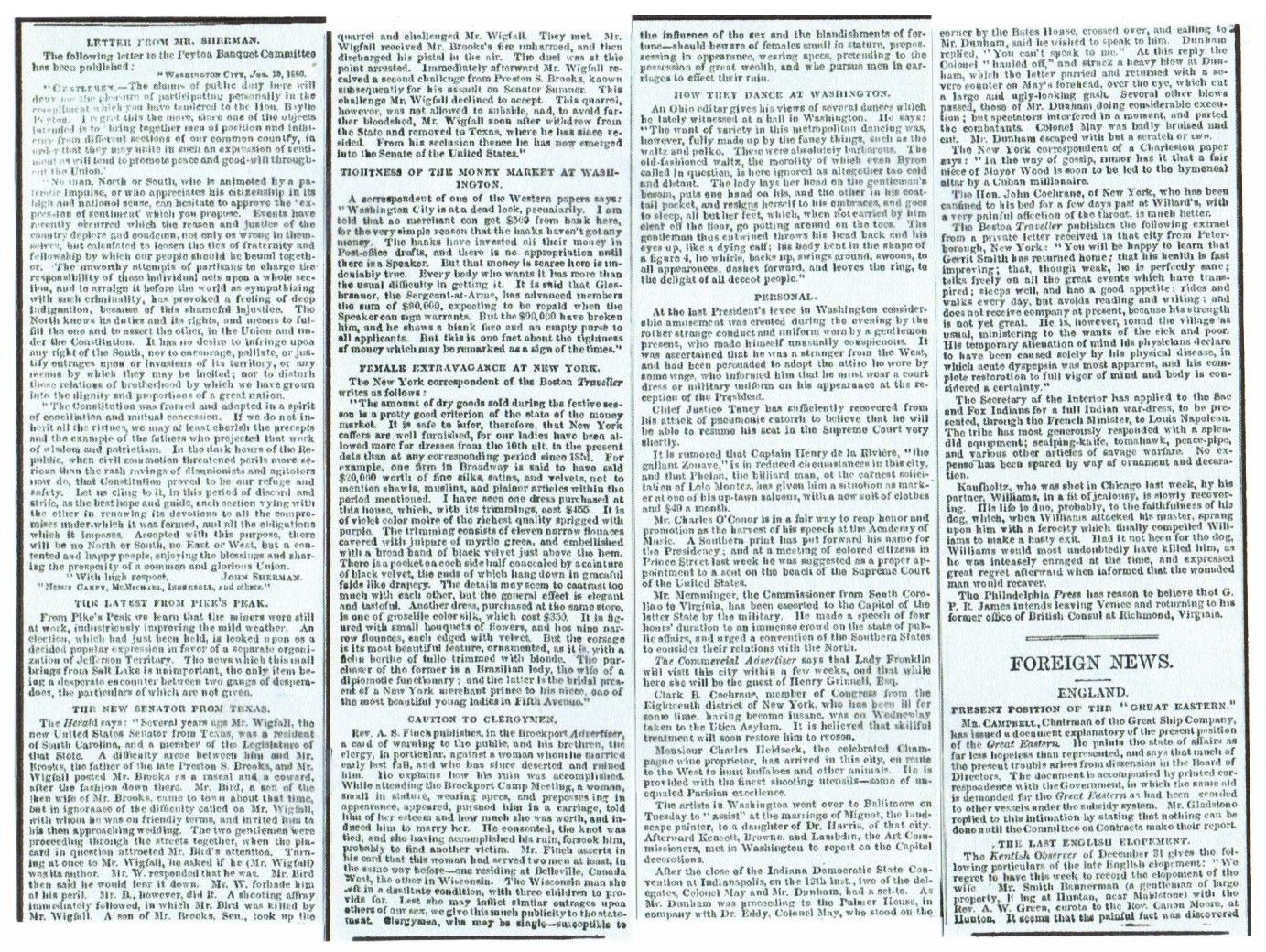














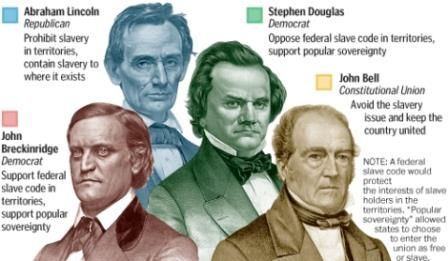
Free Republic University, Department of History presents U.S. History, 1855-1860: Seminar and Discussion Forum
Bleeding Kansas, Dred Scott, Lincoln-Douglas, Harper’s Ferry, the election of 1860, secession – all the events leading up to the Civil War, as seen through news reports of the time and later historical accounts
First session: November 21, 2015. Last date to add: Sometime in the future.
Reading: Self-assigned. Recommendations made and welcomed.
Posting history, in reverse order
To add this class to or drop it from your schedule notify Admissions and Records (Attn: Homer_J_Simpson) by reply or freepmail.
SEMINARY, Sunday Evening, January 29, 1860.
DEAR GENERAL: I received this p.m. your official letter on the rumor in town that some cadet had gone into a common grog shop and drank liquor. I forthwith embodied it into an order and published it at retreat. I will bear my testimony to the general good behavior of the young men here, and I will not allow my mind to be prejudiced against them by any mere general assertion of any person in Alexandria. I do not believe the report. It may be true, and even if so, I hope we are able to plant the roots of this institution so deep in the soil of truth, honor, knowledge, and science, that it cannot be shaken by the mere clamor of any town. If the men of Alexandria have the interests of us at heart let them deal by us as fair men.
If young men go into saloons, let them convey to me or to you openly, or even confidentially a statement, naming persons, and dates, and not [make] general, blind assertions, intangible, calculated to do mischief, and utterly incapable of good. I know there are some who may elude us, their teachers. We did it when boys, and boys will outwit their masters long after you and I are gone, but I know that generally the conduct of the young gentlemen here, at Alexandria, going and returning, has been as proper and fair as that of any other equal number at West Point or Lexington. I have indirectly satisfied myself of these truths, and shall permit a portion of them each Sunday to go as now under marchers and to return as now for dinner here. I do not expect them to do any thing else than young gentlemen but should any well established case of drinking or rowdyism occur, it shall be punished summarily. But I beg of you to demand of any informer specific facts.
I hear that complaints are made by merchants, apothecaries, booksellers, and hotel-men - even Dutchmen who cannot speak English - damning us because they can't make any money out of us.
I repeat, the young men here, now fifty-one, are generally well behaved, appear well-satisfied, are with a few exceptions progressing in their studies, and I never saw such manifest interest in the drill, we can hardly keep them back. They attend roll calls with great punctuality and we have no complaints of them other than would be naturally expected. They write many letters, the best kind of advertisement, and they can better spread the necessary information of the characteristics of the school than we could do by advertisements, circulars, or letters.
I did intend to send Bragg a copy of your bill,1 but I send the copy herewith to you. Mr. St. Ange will make you another copy, and if necessary you can send this to Bragg. I wrote him fully. I also wrote yesterday to Dr. Smith. I still have many letters of inquiry; all of which I answer fully or by sending an appointment. As you say we must jog along in studies at this irregular term till the legislature determine the exact character of this school and until a new working, practical Board of Control is organized. I hope that will be soon.
I have been out fighting a fire which threatened a fence, and now have a tooth-ache, not calculated to make me cheerful. Sunday to me instead of a day of rest is one of dread, for fear of these very disagreeable rumors which I cannot help. . .
[P.S.] By the way a Mrs. C— brought a son here a few days since, of proper age and appearance and I received him. She said she was in the family of Mr. Chambers, that she did not know the rules, etc., but that as soon as Mr. C— got up from New Orleans, she would send me the money. It is time I should hear from her. Do you know of her? Can you find out, as I had to act on her bare words, she being an utter stranger. The boy is a fine, bright, handsome boy, though not smart. I have notified Mrs. D— that she must send money for her son, and that without it I could [not] procure for him the uniform, about which they are very anxious.
Can you imagine where we could get fifty-five bayonets and scabbards? There are none in the State Arsenal at New Orleans. The U.S. Arsenal at Baton Rouge is under a citizen, else I would make a desperate effort there, promising to pay, unless I could get an order from the Secretary of War. I would not dare approach Mr. Floyd, as Sherman is not a fair sounding name there just now. My aim is to have fifty-five muskets [privates] and five sergeants and corporals, all uniformed early in March.
1 A bill providing for a more efficient organization of the Seminary. — Ed.
SOURCE: Walter L. Fleming, General W.T. Sherman as College President, p. 128-31
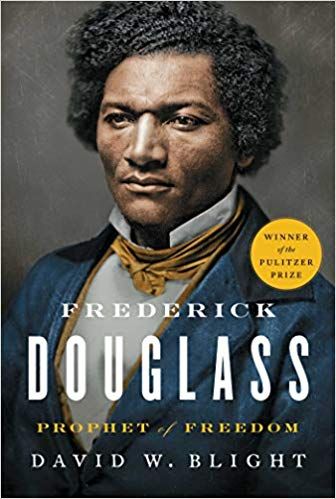
Continued from December 19, 1859 (reply #6).

David W. Blight, Frederick Douglass: Prophet of Freedom
It is true that the Republican party have been in possession of the government of the State of Iowa during the last five years and upward. They have had the unlimited control of the government of that State in every one of its departments. They have had a succession of Governors of that political party. They have had all the judicial tribunals, with very few exceptions; and all the judges of the Supreme Court have belonged to that party. Their majorities in the House of Representatives and in the Senate of the State have been predominating, almost two to one, during four successive Legislative Assemblies. But it is not true that the General Assembly of that State has ever passed any law in violation of the Constitution of the United States, in regard to the fugitive-slave law, or in regard to any other act of Congress. No law has been passed by that State, either since it has been under the domination of the Republican party, or before it came under their control, that in the remotest degree contravenes the rights of any of the sister States, or interferes with the relation of master and slave, or master and servant.
I have not risen for the purpose of making this explanation, because I am disposed to censure or approve the acts of this kind that have been passed by other States. I have no judgment to pronounce upon that subject. I have no criticism to make on that species of legislation. It is no part of my business, as I understand it, to sit here and arraign the action of sovereign States of this Union in regard to their local laws, whether they may be as objectionable as are the laws of Louisiana and South Carolina to Senators, like the Senator from Massachusetts, or whether they are as objectionable as are the laws of Massachusetts and Connecticut to the Senator from Georgia, and others who act and feel with him. That is not my business. But I am not disposed to let the State of my adoption, where I have the happiness to reside, and which I have the honor here in part to represent, have either the glory or the discredit—whichever way they may be regarded by Senators — of passing any law which she did not pass. Whenever she shall see fit to pass a law of this kind, or of any other kind, I, as a citizen of that State, will express my opinion in approbation or in disapprobation of it, as my judgment shall dictate.
Nor do I allude to this subject at this time for the purpose of relieving myself, my State, or the people whom I represent, from the epithets which were so abundantly poured out upon them by the Senator from Georgia. If there are any people in my State who will be disturbed by them it will not be the men with whom I act, but those who profess a sympathy and affinity for the political party with which the Senator from Georgia associates. So far as the Republicans are concerned, I can vouch for them that they will never be won or intimidated by adjectives, no matter how boisterously, or how numerously, or how harshly, they may be applied.
SOURCE: William Salter, The Life of James W. Grimes, p. 123-4
OK now it’s just the image in reply #1 that has a not available image.
Aaaand now they all show fine. Repeated refreshing didn’t help but when I added replies they returned one by one.
WASHINGTON, January 31, 1860.
MY DEAR PIKE: I am rejoiced to hear you talk so sensibly. I am for Pitt, and hope our State will be for him in good faith, and secure his nomination. But if, after all, this cannot be done, I am for Seward. No indiscriminate admirer of the governor, I cannot forget how much he has done for the great cause, how brave and logical hare been his words, nor the trials and struggles of the last eight years in this Golgotha. May Maine be firmly and honestly for Fessenden; but let her not be used to defeat not alone her noble son, but every genuine Republican.
I have no doubt that you are entirely right in your apprehensions that there is a deep, widely extended, and formidable movement to nominate Bates, or some one like him, and to this fact, in my honest opinion, is it due that John Sherman was not elected Speaker weeks ago. The effect of electing our first and only candidate, and a Helper signer, after all the clamor made on that subject, was seen, and it was also surmised what would be the argument if, driven from a straight Republican nominee, a non-Helper, non-representative candidate should be chosen. Hence sundry diversions from Sherman to South Americans, hinting to the Democrats to hold on and our line would break soon. Hence the movements of at least one Bates man, who professes strong Republicanism, of whom I may speak hereafter. Sherman permitted the campaign to be directed in the main by these men, and was persuaded by them to favor the diversions I have referred to, or some of them, and to make what I regard as unfortunate speeches. There is not, that I know of, a single correspondent here who has understood the ground we were travelling, or who, if he understood it, has not been laboring in the interest of the “opposition” party rather than of the Republican party.
With our “Peck” of troubles in Maine, and anybody for the Republican nominee who is not a live and true Republican, we shall have a campaign such as I hope not to be obliged to labor in, and which would not promise the most happy results.
Put us on the defensive, set us to explaining and apologizing, give us a candidate of whom we only know that he is an old line Whig and never a Republican, and the canvass will be the hardest we ever had.
When are you coming on?
J. S. PIKE, Esq.
SOURCE: James Shepherd Pike, First Blows of the Civil War: The Ten Years of Preliminary Conflict in the United States from 1850 to 1860, p. 482-3
[January and February, 1860].
DEAR BROTHER: I received your letter explaining how you happened to sign for that Helper book. Of course it was an unfortunate accident, which will be a good reason for your refusing hereafter your signature to unfinished books. After Clark's resolution, you were right, of course, to remain silent. I hope you will still succeed, as then you will have ample opportunity to show a fair independence.
The rampant southern feeling is not so strong in Louisiana as in Mississippi and Carolina. Still, holding many slaves, they naturally feel the intense anxiety all must whose property and existence depend on the safety of their property and labor. I do hope that Congress may organize and that all things may move along smoothly. It would be the height of folly to drive the South to desperation, and I hope, after the fact is admitted that the North has the majority and right to control national matters and interests, that they will so use their power as to reassure the South that there is no intention to disturb the actual existence of slavery.
. . . The excitement attending the speakership has died away here, and Louisiana will not make any disunion moves. Indeed, she is very prosperous, and the Mississippi is a strong link, which she cannot sever. Besides, the price of negroes is higher than ever before, indicating a secure feeling. . .
I have seen all your debates thus far, and no southern or other gentleman will question their fairness and dignity, and I believe, unless you are unduly provoked, they will ever continue so. I see you are suffering some of the penalties of greatness, having an awful likeness paraded in Harper's, to decorate the walls of country inns. I have seen that of Harper, and as the name is below, I recognize it. Some here say they see a likeness to me, but I don't.
. . . I don't like the looks of the times. This political turmoil, the sending commissions from state to state, the organization of military schools and establishments, and universal belief in the South that disunion is not only possible but certain, are bad signs. If our country falls into anarchy, it will be Mexico, only worse. I was in hopes the crisis would have been deferred till the states of the northwest became so populous as to hold both extremes in check. Disunion would be Civil War, and you politicians would lose all charm. Military men would then step on the tapis, and you would have to retire. Though you think such a thing absurd, yet it is not so, and there would be vast numbers who would think the change for the better.
I have been well sustained here, and the legislature proposes further to endow us well and place us in the strongest possible financial position. If they do, and this danger of disunion blow over, I shall stay here; but in case of a breach, I would go north. . .
SOURCE: Walter L. Fleming, General W.T. Sherman as College President, p. 118-20
Hi.
Many on both sides saw the conflagration that was about to happen. Unfortunately none could stop it.
Maybe cooler heads will prevail this time...
5.56mm
A year ago I didn’t see any real parallels between 1859 and 2019. Events since then lead me to believe there are similarities after all. Yesterday I saw someone tweet that, if Bernie doesn’t win the nomination, the Democratic Party will be torn in half. I don’t know if I would go that far but it was a little startling to read that as I focus on the events of 1860.
BURLINGTON, IOWA, February 2, 1860.
PARTICULAR PIKE: The ills of a congested liver, brought on by attempting to decipher a letter of the First of the Tribunes, addressed to me from Galesburg, Ill., have been much assuaged by your comforting letter of the 29th of January. When I look at a bald head, I expect to find under its polished surface good sense. Horace is an exceptional case. I am glad you agree with me about Edward Bates. I have no doubt Blair is right about him (Bates). He is with us in sentiment and sympathy. But, in the language of Daniel the Dark, “What is all this worth” for a President? For a church-warden or a congregational deacon I should be for him, with both hands up. What business have we to nominate and elect a man President who has never been in political life, who has no taste for politics, and no personal knowledge of public men? If I had had any room for a favorable impression of his qualities beyond my slight acquaintance with him, Peter Parley's indorsement would finish it out. The paper was bad enough before, as the bank president said, “but with that indorsement it is not worth a d—n.” For God's sake let us look to life and not to resurrection for our success in '60. I go in for electing; but why go into the bowels of Niggerdom for a candidate? If you can carry Missiouri for Bates, you can carry Arkansas for him ; and you can lift yourself up by the waistband daily for ten years before you can do either. The King of Terrors has a large work to do in Missouri before any Republican candidate can touch bottom there. I pray to be spared the anguish of voting for any man who can get this electoral vote.
With regard to the governor, the slender chance he had has gone out with John Sherman. Possibly you know what we have gained by electing old Pennington; I don't. I would far rather have been beaten with E. than to have backed down from him. I am consoled somewhat that it was not Corwin.
Pitt Fessenden would make a President after my own heart. But he is too near the “open Polar sea.” Uncle Dan's telescope could not discern the North Star, and your feeble lens can hardly reach it. If he lived in Iowa, or Greeley's paradise of bullfrogs, Indiana, he might come in; but we can't go into the tall timber of Maine. The question now recurs on the original question, “Who are you (I) for?” I am for the man who can carry Pennsylvania, New Jersey, and Indiana, with this reservation, that I will not go into cemetery or catacomb; the candidate must be alive, and able to walk at least from parlor to dining-room. I am willing to take the opinions of the delegates from those States on this point. But if the choice is to be between King Stork and King Log, count me in for the former. I had rather have a President who would take me by the nape of the neck and kick me down stairs, than to have one who would smile me out with the hypocritical leer of that greatest of all nuisances in the White House, Millard Fillmore.
FITZ HENRY WARREN.
SOURCE: James Shepherd Pike, First Blows of the Civil War: The Ten Years of Preliminary Conflict in the United States from 1850 to 1860, p. 483-4
Fitz Henry Warren Wikipedia page
“On to Richmond!” will be his creation while he is an editorial writer on the NY Tribune.

The Diary of George Templeton Strong, Edited by Allan Nevins and Milton Halsey Thomas
Republican Office
Knoxville, Ill. Feb. 3d, 1860
Hon. A. Lincoln
Sir – I enclose you an article, written by Davidson, and published in the Monmouth Review of to-day, not knowing that you will receive it from any other source. I suppose the extract is from your Kansas speech; and more, I think it is all right. The only importance I attach to it is, that it is the beginning of some infamous plot, concocted by the Democrats of Illinois and Missouri, intended to defeat your nomination in the Chicago Convention. I may be mistaken – but “forewarned,” &c.
Letters from some of my friends from at Washington, D. C., express strong desires for your nomination, and seek to strengthen the force already committed to your interest.
If Mr. Cameron will be content with the Vice Presidency, many of your friends suppose there will be but little difficulty in forming a ticket – Lincoln and Cameron. Hurrah!
But perhaps I am presuming too much upon the introduction I received to you in Peoria, at the time of your reply to Douglas, and bring this note to a close with my best wishes for your success.
SOURCE: Abraham Lincoln Papers at the Library of Congress, Washington, D. C.

The Diary of George Templeton Strong, Edited by Allan Nevins and Milton Halsey Thomas
Davis was trying to square a circle that could not be squared.
Disclaimer: Opinions posted on Free Republic are those of the individual posters and do not necessarily represent the opinion of Free Republic or its management. All materials posted herein are protected by copyright law and the exemption for fair use of copyrighted works.